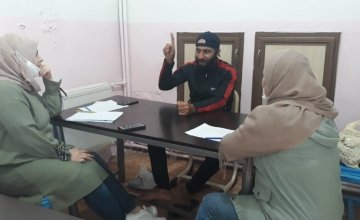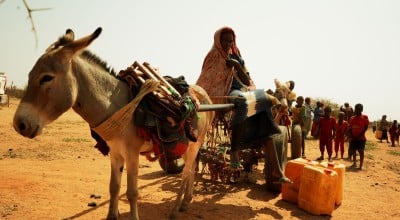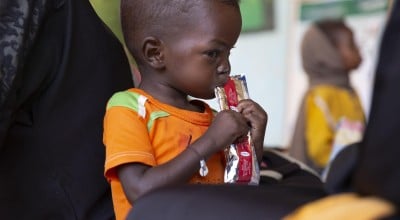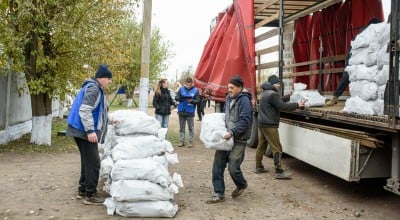
Read our 2024 annual report

Knowledge Hub
When Syrian refugee and father of five Jasem* arrived in Turkey in 2017, life was difficult. He and his young family of six, with his eldest who was nine years of age, were sharing a house with their extended family. It took him a full year to find a job and the support needed as they settled. Through his participation in Concern’s Caregiver Engagement programme, supported by EU Humanitarian Aid, he learnt how to influence his family in a positive way.
Getting on their feet
After his first year in Turkey, Jasem (36) became a daily worker, sometimes working in agriculture or in the local market, taking whatever irregular job was offered to him. Over time, he registered for the EU-funded Emergency Social Safety Net (ESSN), entitling him to a stable monthly financial assistance to buy what his family needed most. These changes enabled him and his family, including their new baby, to move to their own home.
Before these changes, Jasem admits that he was not coping well with life’s forced changes.
“I wasn’t treating my wife and children well—I was hitting my children due to my own financial and psychological situation.”
Jasem and his wife explored every possibility to meet their family’s basic needs. This included seeking support from organisations working in the region. The family were registered to receive support that could help them stay in Turkey longer, as they were afraid of going back to Syria.
This led to a home visit from a member of Concern’s Caregiver Engagement team, working in the local Concern community centre. At that time, Jasem’s two oldest girls, Rand and Reem, were working with him, as they were not regularly attending school. His two daughters were referred to Concern’s cash for education and psychosocial support (PSS) programmes.
What is Caregiver Engagement?
Concern’s Caregiver Engagement (CGE) programme, supported by EU Humanitarian Aid, empowers parents and guardians to provide a positive learning environment at home for their children and helps them support their children’s wellbeing and development. The 10-week programme provides a platform for caregivers to discuss the challenges and the achievements of raising their children. .
In the CGE programme, participants discuss a wide variety of topics, participate in role plays, watch videos and engage in interactive group work. Concern Facilitators, who live, work in the same neighbourhoods as the CGE participants, and are members of the same communities, provide a safe space for participants to share experiences, ask questions, try out new strategies and explore new ideas.
The CGE team and Facilitators emphasise that CGE is part of Concern’s holistic approach to education through access to school, quality delivery of education and wellbeing of the child. These sessions are open to all refugees and are offered around participants’ schedules, including evening and weekend hours. Depending on what is most convenient for participants, sessions are offered in the community centres or in their homes.
Due to the current COVID-19 pandemic, CGE Facilitators are offering sessions remotely via WhatsApp.

The first steps to change
Jasem initially got involved with the CGE programme after his eldest daughter asked him to participate. Although he was reluctant to attend at the start, Jasem enjoyed the group discussions, where participants shared their opinions and experiences.
“The Facilitators respected us, treated us with dignity, and dealt with us as equals. They had humility. We felt that we were one family who exchanged ideas and advice with each other.”
After participating in many CGE sessions, Jasem found new and positive ways to express himself and manage his anger.
“I used to spend my time out playing cards with my friends—matters of no importance. Now I spend all my time at home with my children. I know how to take care of my children and my wife. All of this had an impact on their education level, which started to improve.”
‘Happily ever after’
The most important CGE sessions for Jasem were those about adolescents, their wellbeing and development. He learned about adolescents’ personalities, how to deal with teenagers, how parents can build trust and empathy with their teenage children and how to exercise self-control.
“I learned how to manage my anger. I was ignorant of the concept of positive parenting. Now, my hope for my family is that we live happily ever after. I want us to be able to adapt to any challenges that arise.”
Through CGE, Jasem has learned to channel knowledge and energy in the right direction, toward treating his children well, according to Concern’s Caregiver Engagement Assistant Mohammad Al Khalil.
“Our role as Facilitators focuses on the positive aspects of caregivers and encourages them to support children for their proper physical and mental development. What pleases me most is the change that occurred with them after attending these sessions,” he said.
Dalal Albakr, Facilitator in one of the district community centres, said it was a wonderful experience to facilitate the sessions:
“I felt proud when I saw how people were affected by the sessions and the changes they made—how they attempted to implement all that they heard from us.”
*Name changed for safety and security reasons.
Our gender equality work
Gender equality is globally the most common form of inequality and remains a major obstacle to the eradication of poverty. We specifically focus on gender equality as a means to significantly reduce inequalities and empower people living in extreme poverty to improve their lives.





